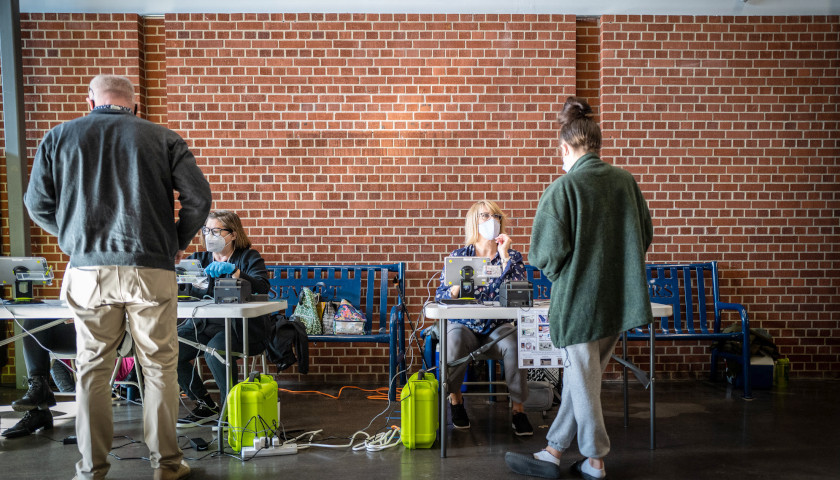by Natalia Mittelstadt
GBI Strategies, the organization at the center of an alleged voter registration fraud probe dating to the 2020 election, had “a lot of red flags,” was untrustworthy, and was a “scam,” its employees told Michigan police in investigative reports.
According to a police report from the Muskegon Police Department, GBI Strategies is under scrutiny as an organization central to alleged voter registration fraud in the 2020 presidential election, which was investigated by city and state authorities before being referred to the FBI. What happen to the probe after the bureau took over remains a mystery.
The Muskegon Police Department began investigating GBI Strategies after the Muskegon City Clerk’s Office reported suspected voter registrations, according to a police report first dated Oct. 16, 2020, which Just the News obtained via a public records request.
There is a business listing for GBI Strategies in Cordova, Tenn., but at least during the 2020 election, the company had a Philadelphia office, employees from Atlanta working in Michigan, and a supervisor in New York for Michigan workers, according to the memos.
Danny Wimmer, press secretary for Michigan Attorney General Dana Nessel, told The Detroit News that GBI Strategies conducts voter registration drives and is headquartered in Tennessee.
“Fraud was determined to have occurred at the lowest levels of the company,” Wimmer told the outlet. “The leading internal indication was that fraud was being perpetrated against GBI Strategies by its employees to fabricate work product without conducting the work expected of them and not in explicit pursuit of defrauding the election infrastructure of the state.”
The company does not appear to have a website, but Open Secrets, a non-partisan research group that tracks money in U.S. politics, provides data showing that GBI Strategies has been paid millions of dollars in the 2020 election cycle by Democratic and far-left groups. These groups include the Democratic Senatorial Campaign Committee ($2,117,605); DNC Services Corp. ($1,031,856); Black PAC ($484,264); and the Biden for President Campaign, who paid GBI Strategies $450,000.
GBI Strategies didn’t respond to multiple calls from Just the News requesting comment.
According to the police report, interviews with employees of GBI Strategies revealed that the company had different projects with various organizations. For example, Muskegon police interviewed a woman who worked for GBI Strategies and explained that the voter registration project was for “Empower Michigan.”
After that project was completed, the woman said she had about a week off before a project funded by “Black Pac” began, which was focused on mobilizing voters. She explained that “They would knock on doors and hand out papers for Gary Peters and Joe Biden,” the police report said.
After describing how she only had four hours to take the job at GBI Strategies following her response to an ad on the Indeed job search site, and being quickly switched to different locations, the woman “said the way this company was operating” made her “think there was a lot of red flags,” according to the police report.
The woman said one person identified as a suspect had mentioned “not to trust the people of GBI” after police found guns at the Southfield, Mich., office and she was also told by someone whose name was redacted that “this whole thing was a scam.”
Another woman who was a canvasser interviewed by Muskegon police during a search of a GBI Strategies office, said that she saw a script which had questions like, “Can I count on you to vote for Joe Biden,” but she “was not given” the script, the report reads. “However, she would ask if people supported Joe Biden,” the report stated.
The canvasser also discussed the voter registration project, explaining that it was not canvassers’ “job to verify the names on the forms,” according to the report. “She said she was sure that she probably had gotten some illegitimate forms/ names from some people.”
The woman also explained that the suspect had talked to the canvassers after the city clerk mentioned that there were forms with fake names and addresses. The suspect “told the workers that they are not getting paid per form turned in,” the police report read. “She made it clear that there was no reason falsify any documents or lie because they are getting paid the same. She also warned them that they would be shut down if they continued to falsify documents.”
Wimmer previously told Just the News that among 8,000 to 10,000 voter registration forms that were submitted to the Muskegon clerk before the 2020 general election, some were suspected to be fraudulent.
“An organization turned in some thousands of voter registrations throughout the fall of 2020, estimated on the high end to be cumulatively 8-10,000, and some within those batches were found to be suspicious or fraudulent,” Wimmer said. There were legitimate registrations within the batches. The city clerk receiving the batches alerted authorities when she began noticing irregularities.
“None of the fraudulent material was incorporated into the state’s qualified voter file, and this had no effect on any ballot requests or associated processes. This attempted fraud was detected because the system worked,” Wimmer added.
When Just the News first asked about the investigation on Aug. 9, the FBI National Press Office told Just the News that its “standard practice [is] to neither confirm nor deny the existence of an investigation.” The Muskegon Police Department also declined to comment on the investigation “because this matter is possibly an active investigation by our law enforcement partners.”
The Muskegon city clerk, Michigan State Police, and Wimmer did not respond to requests for comment.
– – –
Natalia Mittelstadt graduated from Regent University with Bachelor of Arts degrees in Communication Studies and Government.
Photo “Poll Worker” by Phil Roeder. CC BY 2.0.








